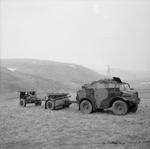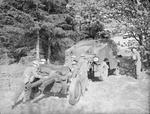Commercial C8 FAT
| Country | United Kingdom |
| Manufacturer | Morris-Commercial Cars Limited |
| Primary Role | Artillery Tractor |
Contributor: Alan Chanter
ww2dbasePopularly known as the Quad, the Morris Commercial C8 FAT (Field Artillery Tractor) was one of the most successful of a range of vehicles produced by Morris-Commercial Motors for the British Army. The Quad, which had originally been developed by Guy Motors as the Quad-Ant Artillery Tractor, entered service in October 1939 and was widely used throughout the war as the standard towing vehicle in British (and many Commonwealth) field artillery regiments for moving the 18- or 25-pounder field gun and later the 17-pdr Anti-Tank gun. Production finally ended in 1945.
ww2dbaseThe C8 Quad was powered by a 70 horsepower Morris four-cylinder 3,500 cubic centimeter petrol engine mounted on a sub-frame and driving the permanently driven four-wheel-drive wheels through a transmission of five forward and one reverse gears, which thereby provided the sturdy prime mover with a good cross-country mobility. This engine/chassis layout was used on several other Morris types, such as the Morris 15 cwt truck and the C9B long-wheelbase version which was produced as a self-propelled Bofors Light Anti-Aircraft Tractor.
ww2dbaseThe peculiar all-metal bodywork shape and metallic sheathing of the Quad led to a common belief that it was bullet-proof; this was never so, for the metal was too thin to even protect against shell splinters. The interior of the large cab held seats for the driver and the six men of the 25-pdr detachment, their equipment and stowage lockers for the gun's ammunition. The gun-crew commander sat alongside the driver and had a roof hatch through which he could command a view over the gun and limber as they were towed behind the Quad. A large winch, which could lift loads of up to 4,000 kilograms, was installed over the rear differential and a spare wheel was carried on the sloping rear deck.
ww2dbaseWhile early Quads had the distinctive "beetle-back" shape, from 1944, the final model, the Mark 5, moved away from this characteristic shape as it was realised that it was too readily recognisable from the air, and therefore instantly indicated the position of an artillery unit. The Mark 5 was therefore given a more square body with a canvas-covered cargo space at the rear which made the vehicle resemble an ordinary cargo truck.
ww2dbaseWhile a large number of Quads had been lost during the British Expeditionary Force's withdrawal from Dunkirk, France in 1940, it continued to be built in large numbers by Morris, Ford and Chevrolet in various styles (including the similar Karrier KT4 used by Indian Divisions), and would continue to provide excellent service to the Artillery during the North-Africa, Italian and North-west Europe campaigns. The Morris Quad while somewhat noisy and rough-riding was actually quite warm and snug inside, and well loved by two generations of artillerymen. Such was the Quad's rugged and reliable reputation that it remained in service until long after the war - not being phased out until as late as 1960. Post war the Quad would see more active service during the Korean and Malaysian conflicts. Today, one example is preserved by the Royal Regiment of Artillery as a memento and several others are known to be in private ownership.
ww2dbaseSources:
Philip Trewhitt: Armoured Fighting Vehicles (Dempsey Parr, 1999)
Ian V. Hogg & John Weeks: The Illustrated Encyclopedia of Military Vehicles (Hamlyn 1980)
John Sanders: 8th Army in the Desert (Patrick Stephens, 1976)
Wikipedia
Last Major Revision: Apr 2018
SPECIFICATIONS
C8
| Machinery | Morris EH 4-cyl 3.5L (214ci) petrol engine rated at 70bhp |
| Suspension | Wheel, 4x4 |
| Crew | 6 |
| Length | 4.49 m |
| Width | 2.28 m |
| Height | 2.36 m |
| Weight | 3.3 t |
| Speed | 56 km/h off-road; 80 km/h on-road |
| Range | 257 km |
Photographs
 |  |  |  |
Please consider supporting us on Patreon. Even $1 per month will go a long way! Thank you. Please help us spread the word: Stay updated with WW2DB: |
- » US Women's Army Corps "Six Triple Eight" Awarded with Congressional Gold Medal (30 Apr 2025)
- » Wreck of Soviet Submarine M-49 Found (10 Apr 2025)
- » Japanese Emperor Visited Iwoto (Iwo Jima) (8 Apr 2025)
- » Race, Holocaust, and African-American WW2 Histories Removed from the US Naval Academy Library (7 Apr 2025)
- » US Government Plans to Purge WW2 Information (17 Mar 2025)
- » See all news
 |
- » 1,167 biographies
- » 337 events
- » 44,615 timeline entries
- » 1,244 ships
- » 350 aircraft models
- » 207 vehicle models
- » 376 weapon models
- » 123 historical documents
- » 261 facilities
- » 470 book reviews
- » 28,518 photos
- » 365 maps
James Forrestal, Secretary of the Navy, 23 Feb 1945
Please consider supporting us on Patreon. Even $1 a month will go a long way. Thank you!
Or, please support us by purchasing some WW2DB merchandise at TeeSpring, Thank you!